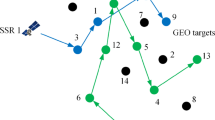Abstract
The original preset schedule of space telescopes can be disrupted when they receive ultra-high-priority unpredictable tasks. The main objective of this study is to observe such unpredictable tasks, the instability of which leads to failures in delivering the promises made. This paper proposes a method for retaining the robustness of the original plan. We use space-based multi-band variable objects monitor (SVOM) mission as an example to introduce the proposed method. First, the reasons for instability are discussed in detail. Two proactive strategies are proposed to promote the robustness of the schedule. The proactive strategies use the available windows of a given list of jobs. However, the realistic problem of SVOM is analysed using a rescheduling algorithm based on NSGA-II experiments with SVOM scenarios show that the two proposed strategies are effective in reducing the instability caused by unpredictable interruption.
Similar content being viewed by others
References
Vieira G E, Herrmann J W, Lin E. Rescheduling manufacturing systems: A framework of strategies, policies, and methods. J Sched, 2003, 6: 39–62
Huo Y, Reznichenko B, Zhao H. Minimizing total weighted completion time with an unexpected machine unavailable interval. J Sched, 2014, 17: 161–172
Luo W, Luo T, Goebel R, et al. Rescheduling due to machine disruption to minimize the total weighted completion time. J Sched, 2018, 21: 565–578
Xu Z, Xu D. Single-machine scheduling with workload-dependent tool change durations and equal processing time jobs to minimize total completion time. J Sched, 2018, 21: 461–482
Liu P, Wang C, Lu X. A note on minimizing total weighted completion time with an unexpected machine unavailable interval. J Sched, 2019, 22: 255–262
Nguyen N Q, Yalaoui F, Amodeo L, et al. Total completion time minimization for machine scheduling problem under time windows constraints with jobs’ linear processing rate function. Comput Oper Res, 2018, 90: 110–124
Zhang L, Gao L, Li X. A hybrid genetic algorithm and tabu search for a multi-objective dynamic job shop scheduling problem. Int J Prod Res, 2013, 51: 3516–3531
Policella N, Smith S F, Cesta A, et al. Generating robust schedules through temporal flexibility. In: Fourteenth International Conference on Automated Planning and Scheduling. Whistler, 2004. 209–218
Pinedo M, Hadavi K. Scheduling: Theory, algorithms and systems development. 1992, doi: https://doi.org/10.1007/978-3-642-46773-85
Billaut J C, Moukrim A, Sanlaville E. Flexibility and Robustness in Scheduling. Weinheim: Wiley-ISTE, 2008. 352
Smith D E. Choosing objectives in over-subscription planning. In: 14th International Conference on Automated Planning and Scheduling. Whistler, 2004. 393–401
Himmiche S, Marangé P, Aubry A, et al. Robust production scheduling under machine failures: A DES based evaluation approach. IFAC-PapersOnLine, 2018, 51: 271–276
Li Y, Wang R, Xu M. Rescheduling of observing spacecraft using fuzzy neural network and ant colony algorithm. Chin J Aeronautics, 2014, 27: 678–687
Lenstra J K, Rinnooy Kan A H G, Brucker P. Complexity of machine scheduling problems. Ann Discrete Math, 1977, 1: 343–362
Graham R L, Lawler E L, Lenstra J K, et al. Optimization and approximation in deterministic sequencing and scheduling: A survey. Ann Discrete Math, 1979, 5: 287–326
Wall M B. A genetic algorithm for resource-constrained scheduling. Dissertation of Doctoral Degree. Cambridge: Department of Mechanical Engineering, Massachusetts Institute of Technology, 1996
Mehta S V, Uzsoy R M. Predictable scheduling of a job shop subject to breakdowns. IEEE Trans Robot Automat, 1998, 14: 365–378
Author information
Authors and Affiliations
Corresponding author
Additional information
This work was supported by the Strategic Priority Research Program on Space Science, Chinese Academy of Sciences (Grant Nos. XDA15040100 & XDA15040400).
Rights and permissions
About this article
Cite this article
Li, D., Gu, Y., Jaubert, J. et al. A robust scheduling algorithm for space telescopes with unpredictable tasks. Sci. China Technol. Sci. 64, 571–584 (2021). https://doi.org/10.1007/s11431-020-1639-4
Received:
Accepted:
Published:
Issue Date:
DOI: https://doi.org/10.1007/s11431-020-1639-4




